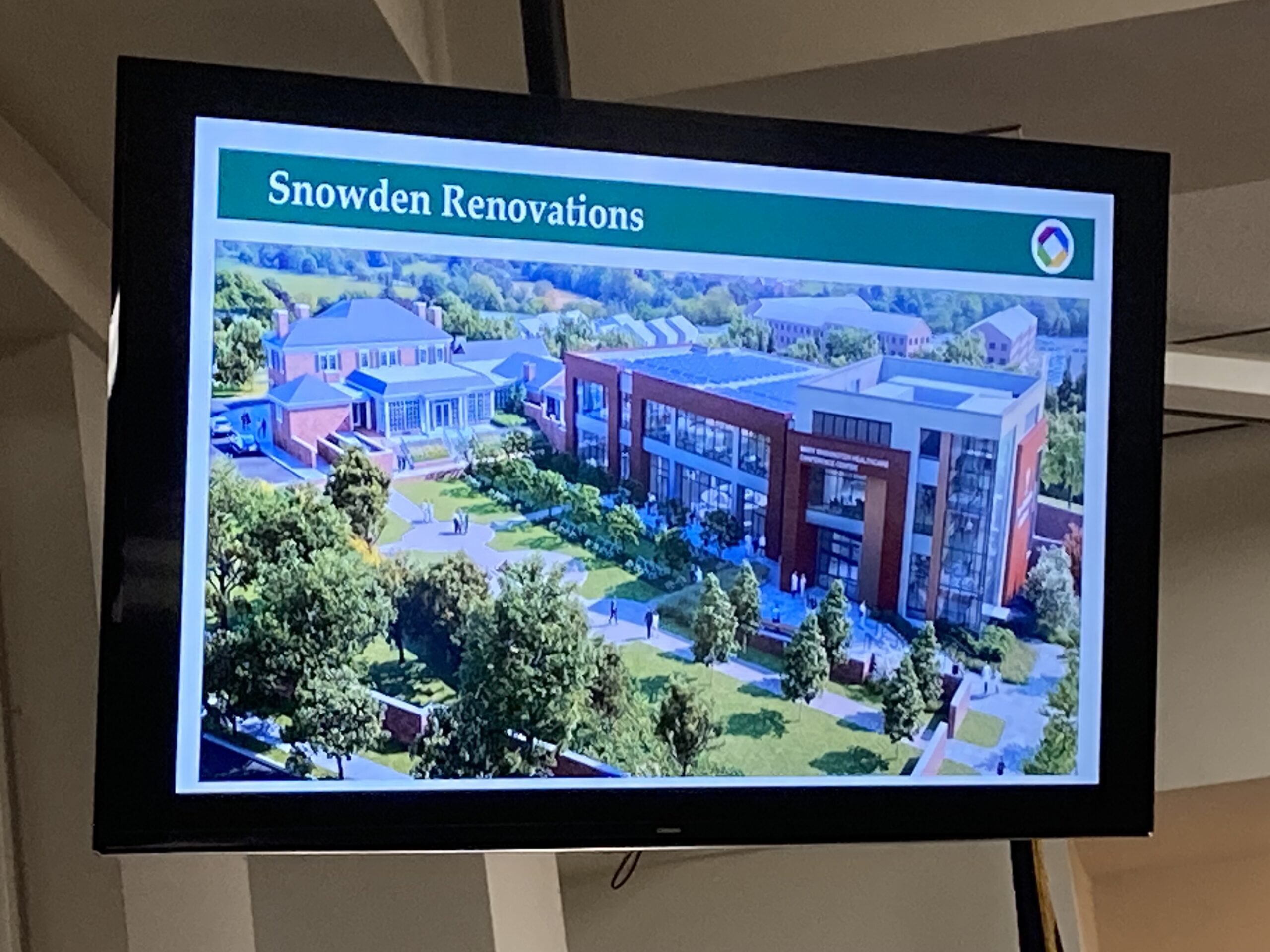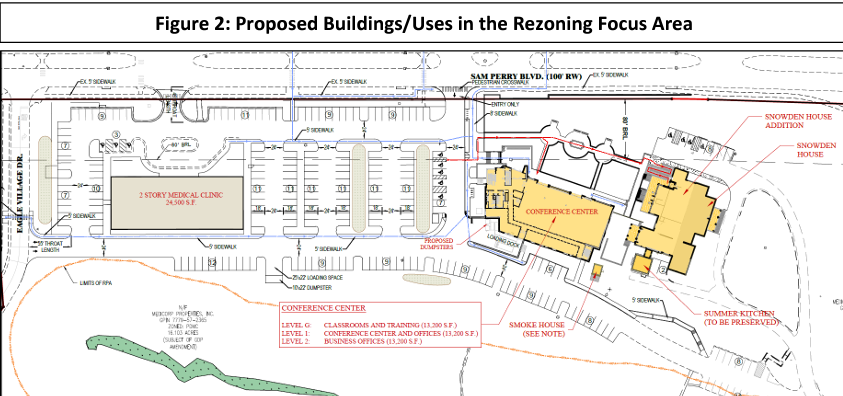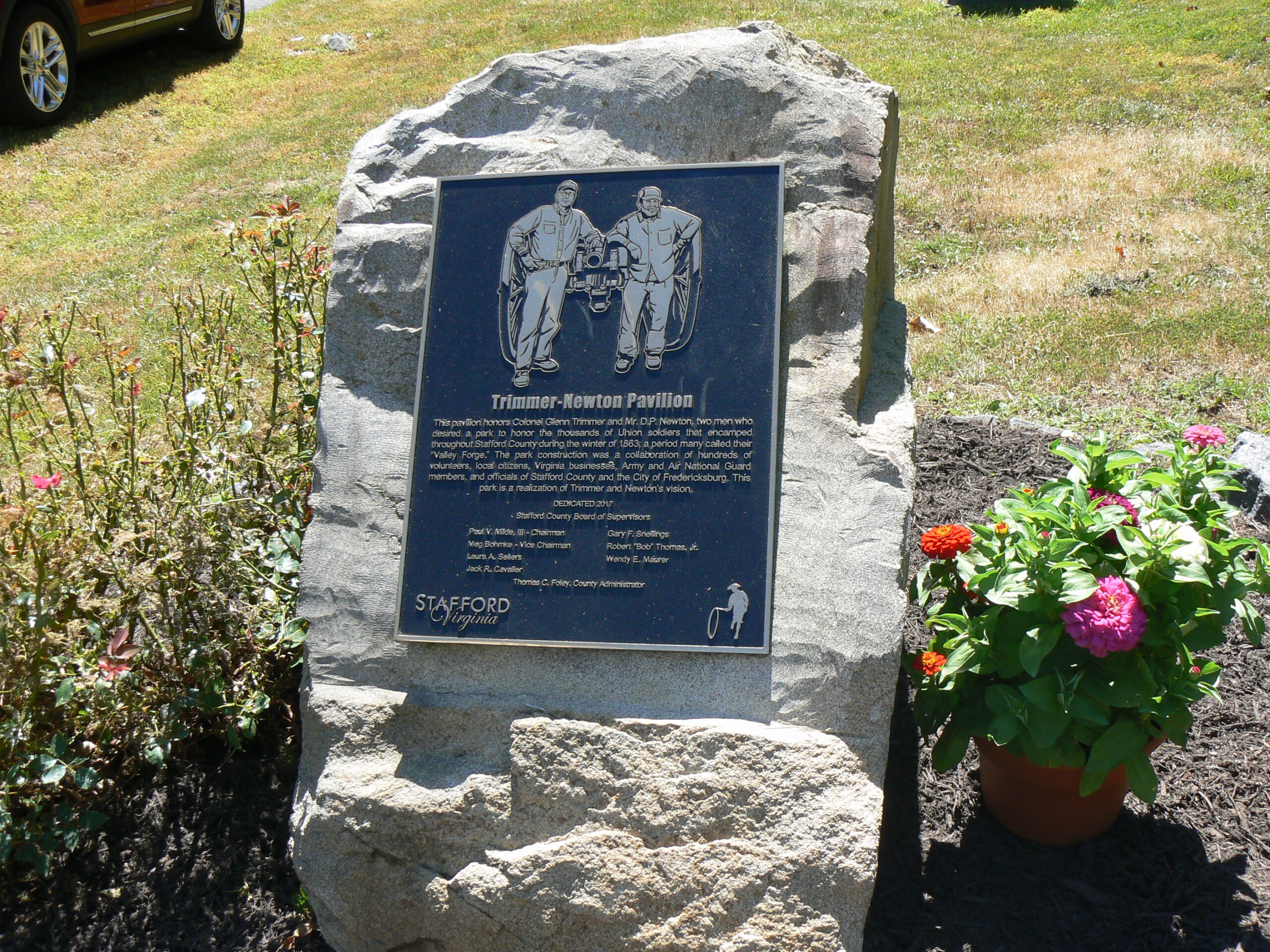
Concerns about Kid’s Station remain. MWHC touts graduate education program as solution to region’s crushing shortage of physicians.
The Fredericksburg Planning Commission voted 6-to-1 on Wednesday evening to recommend approval of Mary Washington Healthcare’s rezoning request.
The request will next be subject to another public hearing before City Council, which will have final say into whether it is approved or denied.
The healthcare system is proposing to build a 6,000-square-foot addition to Snowden House and convert it into a residence and events center; build a new three-story office, training, and conference center; and demolish the existing daycare center and construct a new two-story medical clinic in its place.
The Planning Commission held a public hearing on the proposal last month and continued it to this month’s meeting. Commissioners sought more information from MWHC about its broader strategic plans, and particularly its rationale for selecting the Kids Station parcel over other available parcels on the hospital campus, given the ramifications for families who depend on the daycare center.
The hospital corporation sent a contingent of representatives from its Board of Trustees and executive leadership team to address these concerns on Wednesday.
“Our team will share with you the history and rationale leading to this rezoning request,” said Bruce Davis, Chair of the hospital’s Board of Trustees. “We want to impress upon you the commitment of the Board.”
Eric Fletcher, the hospital corporation’s senior vice president and chief strategy officer, said the rezoning is necessary so that MWHC can grow its graduate medical education program, which is currently in its inaugural year and which Fletcher described as “the answer” to solving one of the community’s pressing health needs—access to care.
“We are investing tens of millions of dollars into this plan as we speak,” Fletcher said. “That’s why we need you to approve this.”
Meeting a Need
Access to care was identified as a health need during the most recent Community Health Needs Assessment, which MWHC must conduct every five years in order to maintain its nonprofit status.
Fletcher said the Fredericksburg area ranks “in the bottom 2% nationally” in terms of the number of primary care physicians per population, according to the 2022 Clinical Supply Profiler published by the Advisory Board, a healthcare consulting firm that “helps health care leaders, including health plans, advance their organization’s strategic goals.”
“This is a stunning statistic,” Fletcher said. “Your health care system is going to fix that through graduate medical education (GME),” he said.
In Virginia, according to the 2022 community health needs assessment, which used 2018 data from the American Medical Association, there was one primary care physician per 1,330 people.
In Fredericksburg, there was one per 730 people. In Caroline, the ratio was one to 6,150; in King George it was one to 4,430; in Spotsylvania it was one to 1,660; and in Stafford one to 3,260.
The GME program currently has 21 residents completing their education in family and internal medicine at Mary Washington Hospital. By 2029, the plan is to have 157 residents enrolled in additional disciplines including obstetrics and gynecology, psychiatry, general surgery, and anesthesiology, Fletcher said.
He said graduates often stay and practice medicine in the community where they completed their residencies. Eventually, they will be able to see “thousands” of patients.
Fletcher said the conference and training center will allow the residents to further their education and that it needs to be in close proximity to the hospital. He said the other vacant parcels on the campus are “three to four times” farther from the main hospital.
Though MWHC is specifically requesting that “single-family detached dwelling” be added as a permitted use of Snowden House, Fletcher said Wednesday that the plan is for the building to be used “similar to the [University of Mary Washington’s] Jepson Alumni Executive Center,” which has event space and an apartment for visiting professors.
What about Kids’ Station?
Regarding the daycare center, Fletcher said the hospital system is committed to working with KinderCare, which operates Kids’ Station, to find a new location near the campus.
He said that a Google search identified 19 existing childcare centers near the hospital.
Many families who wrote letters or spoke at last months’ public hearing expressed dismay at MWHC’s proposal to construct the new buildings in three phases while Kids’ Station remains in operation. The families cited concerns about construction noise and the removal of playground equipment.
As a result, MWHC consolidated construction into two phases and proposes to remove 15% of the playground, instead of half. Phase 1 of construction would take place from August of this year through December 1 of 2025, and Phase 2 would begin in September of 2025 and last through September of 2026.
On April 25, KinderCare sent a letter to families stating that, “We are extremely comfortable with [MWHC’s] phased plan and are confident that your children will continue to receive high quality care in a safe environment with minimal to no disruption.”
The letter also stated that KinderCare is “very close to closing a deal on [a] new permanent location” and promised that more information will be provided “in the coming weeks.”
KinderCare did not send a representative to Wednesday’s meeting.
During Wednesday’s public hearing, Cathy Wack, vice president of the Board of Trustees, said the board has “directed a smooth transition and safe conditions for the families at Kids’ Station” and Fletcher also stressed that there will be “no lapse” in childcare service.
But neither the general development plan nor the proffers identify a location for a new childcare center. Commissioner Dugan Caswell—who voted against recommending approval—asked the MWHC team directly about this.
“I heard a commitment to no lapse in service,” he said. “Why not write this into the proffers? Put it in writing?”
The MWHC representatives did not answer this question.
Fletcher did respond to Lydia Fallon, a 5-year-old who attends Kids’ Station and asked at the last meeting how children will be able to nap while construction is on-going.
“That’s a good question and it points out why a hospital campus is maybe not a good place for a daycare center,” he said, citing the noise from ambulances and the occasional helicopter.
Three parents who submitted written comments for Wednesday’s meeting asked MWHC to delay the start of construction until the childcare center has secured a new location and is in operation.
“[When] you want to initiate construction and take away the children’s playground before a new daycare location is secured and everyone is safely settled into that new location, that is when I (and I speak for only myself) start to feel angry,” wrote Tegan Neustatter, the parent of two children who attend Kids’ Station. “These children deserve everything that they have now. They do not deserve 15% less playground and construction-related disturbances as they try to learn and play. They do not deserve to be put second to the bottom line of a healthcare organization.”
“Clearly a positive use”
David Durham, Planning Commission Chair, said that the training center for residents in the graduate medical education program is “clearly a positive use” of the parcel, but pointed out that the actual use replacing the childcare center is not the training center but a medical office.
“I do think it is a false choice of childcare center v. outpatient clinic,” he said. “I think it’s shortsighted, frankly. Instead of a two-story building, why not build a five-story building that includes childcare? But that is their corporate decision.”
Commissioner Mary Margaret Marshall asked the MWHC team to speak to how its strategic plans meet the needs of the uninsured and underinsured.
“It sounds like you have an ability to meet the paying needs of the community, but I think there’s something missing,” she said.
In response, Fletcher said the hospital provides care “regardless of ability to pay” at a value of “$60 million per year.”
Fletcher said in an email to the Advance that this community benefit is calculated on Schedule H of the healthcare corporation’s IRS Form 990. It includes the following categories: “financial assistance at cost” ($10.7 million in 2022); “community health improvement services” ($956,965 in 2022); “health professions education” ($1.8 million in 2022); “subsidized health services” ($48.1 million in 2022); “research” ($368,626); and “cash and in-kind contributions for community benefit” ($2.1 million in 2022).
The community benefit calculation does not include the shortfall for unreimbursed care provided to Medicare patients, Fletcher said.
Commissioners said they appreciated having received more information about the rationale behind the rezoning request and that it’s clear there is a need for more healthcare providers.
They said that from a land use perspective, the uses proposed by MWHC in the rezoning request are positive, but pointed out that the community still has concerns, especially about the future of the childcare center.
They asked the MWHC team to continue engaging with the city and stressed the importance of providing them with information about plans going forward.
Commissioners also asked the public to stay involved with the process as it goes before City Council.




